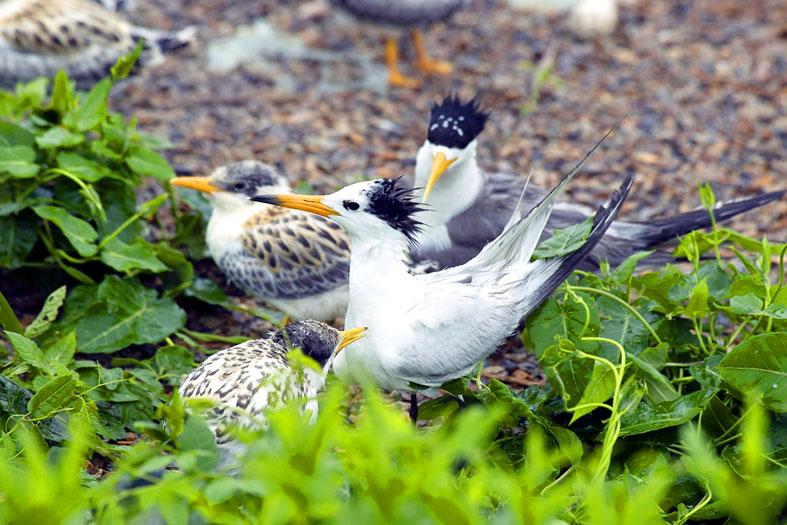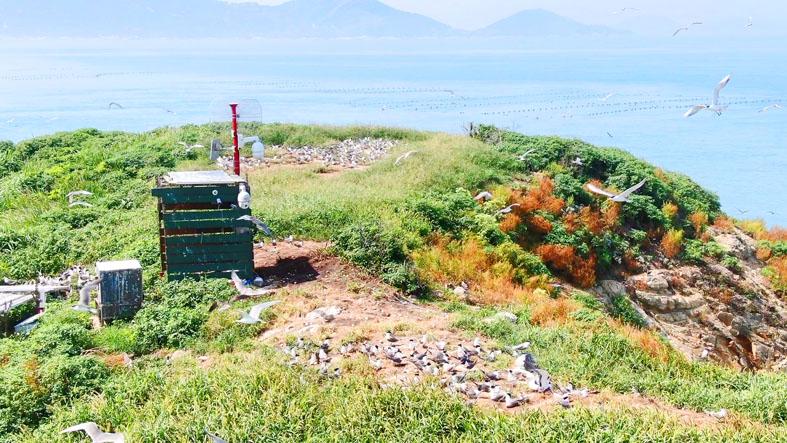A fundraising campaign aimed at helping a critically endangered bird that migrates to Taiwan’s outlying Matsu islands each summer has raised almost half of its target in less than two weeks, a bird conservation group said yesterday.
The Wild Bird Society of Taipei said that it had raised NT$456,611 (US$16,490) for Chinese crested tern (Thalasseus bernsteini) conservation as of yesterday morning, less than two weeks after it began an online campaign on Dec. 18.
The crested tern has a yellow beak with a black tip. It has been listed as a critically endangered species by the International Union for Conservation of Nature, with only 100 of the birds estimated to be living in the wild, the society said.

Photo courtesy of Caichang International via CNA
The society said it hopes to raise NT$1 million by March 17 to install CCTV cameras on Tiejian Island (鐵尖島) in the Matsu archipelago, where a group of Chinese crested terns makes its home from May to September each year after traveling from Southeast Asia to breed.
The Chinese crested tern has been having difficulties laying eggs on the island for the past two years due to the operations of nearby fishing vessels, the society said, adding that light emitted from vessels frightens the birds, disrupts their egg-laying and causes some to leave the island.
The birds are also facing a food shortage because of a disappearing fish population, along with pollution created by trash floating around the island, it said.

Photo courtesy of the Wild Bird Society of Taipei via CNA
The society launched a research program in 2008 in collaboration with a team led by National Taiwan University professor Yuan Hsiao-wei (袁孝維).
Installing cameras on the island should allow for better monitoring of threats, the society said, adding that they would allow the group to intervene when events that pose a danger to the birds occur.
Funding is also to be allocated to recruit staff to conduct monitoring and to hire local vessels to patrol the island’s coast, the society said.
The campaign could also finance the installation of life-sized bird models in a move that the society said would help attract more Chinese crested terns to the island for breeding.
The society also plans to launch a nationwide tour to promote bird conservation in Taiwan.

The first global hotel Keys Selection by the Michelin Guide includes four hotels in Taiwan, Michelin announced yesterday. All four received the “Michelin One Key,” indicating guests are to experience a “very special stay” at any of the locations as the establishments are “a true gem with personality. Service always goes the extra mile, and the hotel provides much more than others in its price range.” Of the four hotels, three are located in Taipei and one in Taichung. In Taipei, the One Key accolades were awarded to the Capella Taipei, Kimpton Da An Taipei and Mandarin Oriental Taipei. Capella Taipei was described by

EVA Airways today confirmed the death of a flight attendant on Saturday upon their return to Taiwan and said an internal investigation has been launched, as criticism mounted over a social media post accusing the airline of failing to offer sufficient employee protections. According to the post, the flight attendant complained of feeling sick on board a flight, but was unable to take sick leave or access medical care. The crew member allegedly did not receive assistance from the chief purser, who failed to heed their requests for medical attention or call an ambulance once the flight landed, the post said. As sick

Minister of Economic Affairs Kung Ming-hsin (龔明鑫) yesterday said that private-sector refiners are willing to stop buying Russian naphtha should the EU ask them to, after a group of non-governmental organizations, including the Centre for Research on Energy and Clean Air (CREA), criticized the nation’s continued business with the country. While Taiwan joined the US and its Western allies in putting broad sanctions on Russia after it invaded Ukraine in 2022, it did not explicitly ban imports of naphtha, a major hard-currency earner for Russia. While state-owned firms stopped importing Russian oil in 2023, there is no restriction on private companies to

INDUSTRY: Beijing’s latest export measures go beyond targeting the US and would likely affect any country that uses Chinese rare earths or related tech, an academic said Taiwanese industries could face significant disruption from China’s newly tightened export controls on rare earth elements, as much of Taiwan’s supply indirectly depends on Chinese materials processed in Japan, a local expert said yesterday. Kristy Hsu (徐遵慈), director of the Taiwan ASEAN Studies Center at the Chung-Hua Institution for Economic Research, said that China’s latest export measures go far beyond targeting the US and would likely affect any country that uses Chinese rare earths or related technologies. With Japan and Southeast Asian countries among those expected to be hit, Taiwan could feel the impact through its reliance on Japanese-made semi-finished products and